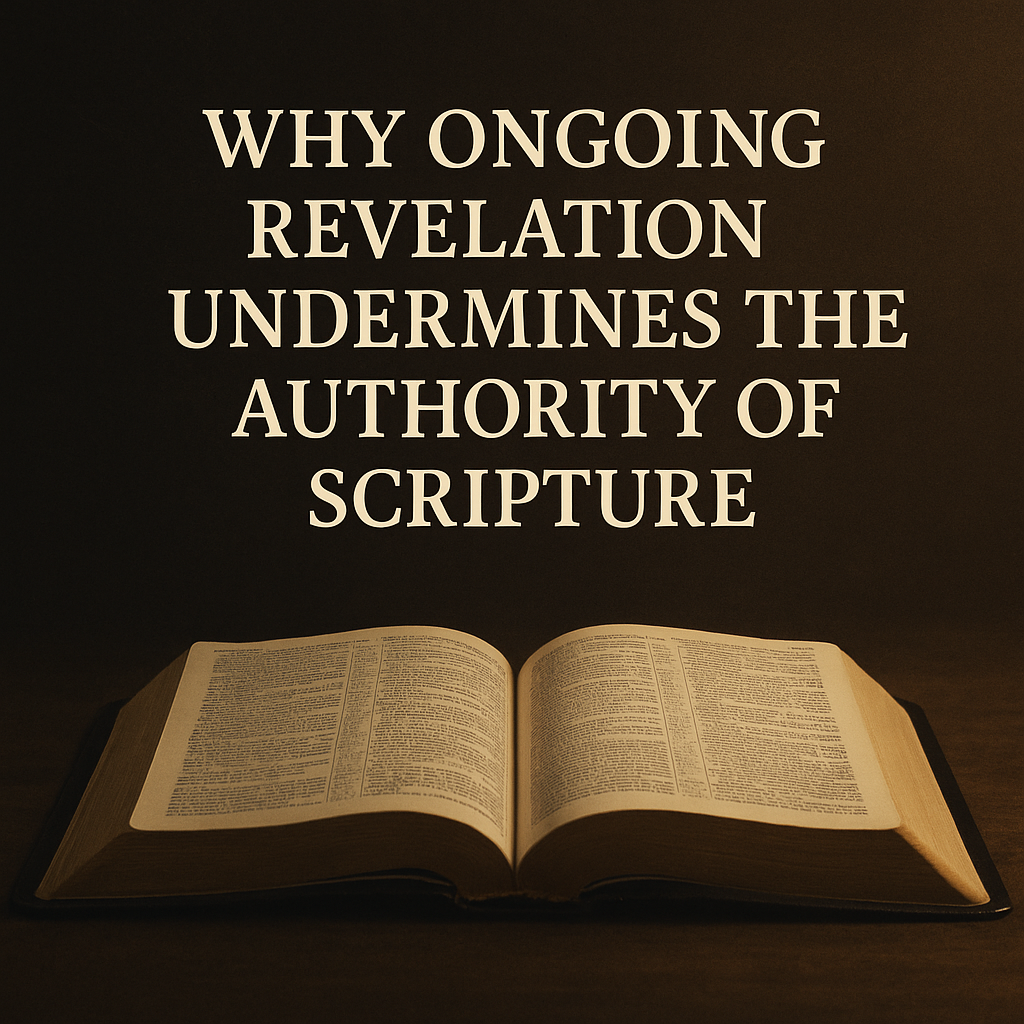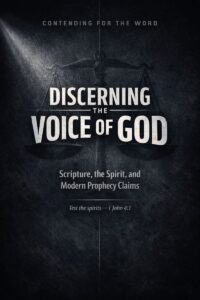⏱️ Estimated Reading Time: 5 min read
Why Ongoing Revelation Undermines the Authority of Scripture
By Dave Jenkins | A Contending for the Word Feature
In an age when social media feeds are flooded with “fresh words,” so-called prophecies, and spiritual “downloads,” many Christians find themselves unsettled and confused. It’s not uncommon to hear someone say, “God told me…” as if that statement alone settles a matter with divine authority.
But Scripture offers a far more secure foundation. God has spoken—fully, finally, and clearly—in the person of Jesus Christ and in His inerrant Word. To seek new revelation beyond the pages of the Bible is not only unnecessary—it’s dangerous. It undermines the sufficiency of Scripture and leads the Church into confusion, error, and in some cases, outright heresy.
1. God Has Spoken Fully in Christ
The Bible teaches that divine revelation has a clear beginning, progression, and culmination in the person and work of Jesus Christ.
“Long ago, at many times and in many ways, God spoke to our fathers by the prophets, but in these last days He has spoken to us by His Son…” — Hebrews 1:1–2
“…the faith that was once for all delivered to the saints.” — Jude 3
“If anyone adds to them, God will add to him the plagues described in this book…” — Revelation 22:18–19
God’s final word is Christ. His redemptive revelation, preserved in the Scriptures, is complete. There is no ongoing installment plan of revelation today. Jesus is not only the fulfillment of the Old Testament—He is the climax of divine speech to humanity.
2. The Canon of Scripture Is Closed
The sixty-six books of the Bible form a complete, sufficient, and authoritative canon. We are not waiting for new books, prophetic insights, or modern apostolic messages to supplement God’s Word. The early Church recognized this, guarding against false teachers and apocryphal writings while affirming the authority of the apostolic witness (Ephesians 2:20).
Today, no one receives infallible revelation equal in authority to Scripture. When someone claims, “God told me something new for the Church,” the biblical response must be: “God’s Word is sufficient and final.”
3. The Spirit Illuminates—He Doesn’t Add
The Holy Spirit plays a vital role in the Christian life, but His ministry is one of illumination, not revelation.
“The Helper, the Holy Spirit… will teach you all things and bring to your remembrance all that I have said to you.” — John 14:26
“We have received… the Spirit who is from God, that we might understand the things freely given us by God.” — 1 Corinthians 2:12–13
“All Scripture is breathed out by God… that the man of God may be complete, equipped for every good work.” — 2 Timothy 3:16–17
The Spirit never contradicts the Word of God. He deepens our understanding of what has already been revealed. He applies the truth—not expands it.
4. The High Cost of “New Words”
When Christians seek spiritual insight apart from Scripture, several dangers arise:
- They diminish biblical authority.
- They elevate subjective emotion over objective truth.
- They make decisions based on unverifiable impressions.
We see this in the New Apostolic Reformation (NAR), where modern “prophets” claim revelation for nations, churches, and global movements—often with no accountability. Failed prophecies go uncorrected. Followers are left confused and spiritually shipwrecked.
These practices may appear spiritual, but they replace the sure Word of God with unstable feelings and personal impressions. The results are often harmful and unbiblical.
5. Church History Warns Us
This is not a new problem. From the early centuries of Christianity, the Church has faced—and rejected—claims of ongoing revelation:
- Montanus (2nd century) claimed to be the mouthpiece of the Holy Spirit, delivering ecstatic utterances that surpassed apostolic teaching. The Church condemned him.
- Joseph Smith claimed new golden plates and divine revelation—resulting in the founding of Mormonism and the rejection of biblical orthodoxy.
- Modern “apostles” and NAR leaders continue in the same dangerous stream, claiming revelation that undermines the sufficiency of Scripture.
The lesson is clear: claims of ongoing revelation always lead to heresy, division, or doctrinal instability.
6. When You Feel Distant from God
Many chase “fresh words” from God because they feel spiritually dry or stagnant. But Scripture offers a better way forward:
- Open your Bible. He still speaks.
- Seek the Savior, not the spectacular.
- Don’t wait for a “word”—you already have the Word.
“If you want to hear God speak, read your Bible. If you want to hear Him audibly, read it out loud.” — often attributed to Justin Peters
God’s Word may not always feel exciting, but it is always true, always trustworthy, and always sufficient.
7. Final Thoughts
The Bible is not outdated. It is eternal (Psalm 119:89). It is not insufficient. It is powerful (Hebrews 4:12). You do not need more than Scripture—you need to go deeper into it.
“The Word of God is like a lion. You don’t have to defend it. Let it loose. It will defend itself.” — Charles Spurgeon
If we truly believe in the sufficiency of Scripture, then we must reject all claims that diminish it—even when they are clothed in spiritual language.
8. A Call to Faithful Discernment
In a world obsessed with “new words,” God’s people must return to the ancient Word. Treasure your Bible. Test every claim. Trust that God’s final Word is Christ—and that in Him, you already have everything you need.
📖 Stay grounded.
🛡️ Stay discerning.
✝️ Stay faithful.
Recommended ResourceS:
Check out this message by Justin Peters on Hearing from Heaven: How to Know the Voice of God (Justin Peters)
Check out Contending for the Word for more.
Dave Jenkins is happily married to his wife, Sarah. He is a writer, editor, and speaker living in beautiful Southern Oregon. Dave is a lover of Christ, His people, the Church, and sound theology. He serves as the Executive Director of Servants of Grace Ministries, the Executive Editor of Theology for Life Magazine, the Host and Producer of Equipping You in Grace Podcast, and is a contributor to and producer of Contending for the Word. He is the author of The Word Explored: The Problem of Biblical Illiteracy and What To Do About It (House to House, 2021), The Word Matters: Defending Biblical Authority Against the Spirit of the Age (G3 Press, 2022), and Contentment: The Journey of a Lifetime (Theology for Life, 2024). You can find him on Facebook, Twitter, Instagram, Youtube, or read his newsletter. Dave loves to spend time with his wife, going to movies, eating at a nice restaurant, or going out for a round of golf with a good friend. He is also a voracious reader, in particular of Reformed theology, and the Puritans. You will often find him when he’s not busy with ministry reading a pile of the latest books from a wide variety of Christian publishers. Dave received his M.A.R. and M.Div through Liberty Baptist Theological Seminary.




